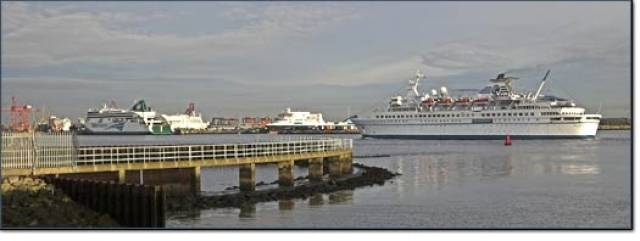#Cancellations - Storm Barbara continues to cause ferry cancellations but also freight operations on the Irish Sea notably those serving Dublin Port in the busy run-up to the festive season.
Strong winds involving a ro-ro freight ferry arriving to Dublin this morning required tugs to assist while berthing at Terminal 5. A freight sailing tonight on a route to the UK has been cancelled.
The bad weather may pose a concern for passengers with possible further ferry cancellations closer to Christmas Eve in particular on the core Holyhead-Dublin services. Thousands of passengers make the trip annually from the UK to reach the capital and beyond. The route from Wales is operated by two operators, Irish Ferries and Stena Line.
At Dublin Port's main passenger ferry facility, Terminal 1 is where Irish Ferries fast-craft Jonathan Swift remains berthed in port due to cancellations as covered on Afloat yesterday. Sailings of the fast-craft's Dublin-Holyhead sailings today are cancellled due to the what the operator describes as 'adverse weather conditions'.
Irish Ferries advises that 'fast-craft' passengers will be accommodated on alternative sailings using the other Holyhead-Dublin cruiseferry Ulysses. Also currently operating on time is the ropax Epsilon.
Recently introduced by Irish Ferries is Oscar Wilde to boost capacity on the Dublin route which too however was affected by the bad weather. The cruiseferry’s morning sailing to Holyhead was cancelled and also this afternoon's sailing at 16.45hrs from the Welsh port to Dublin. Passengers are to be accommodated on tomorrow's 02.30hrs sailing, Saturday 24 December (Christmas Eve).
There have been no Stena Line cancellations reported so far today on their Holyhead-Dublin service which is operated by a pair of ferries. Stena have said that Storm Barbara is to bring wet and windy conditions to the UK and Ireland. The operator added that unfortunately this may cause disruption to some scheduled sailings today and Saturday (Christmas Eve).
It is advisable to check all ferry operator websites for the latest sailing information for times and (dates of operation given the festive season) and those on France-Ireland services.































































